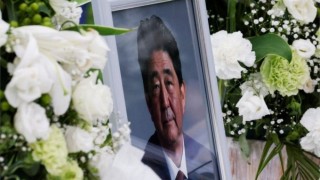Loading
Search
▼ Abe Funeral: Japan Asks Why State Event Is Costing More Than The Queen's
- Category:Event
How could Abe's funeral cost more than the Queen's?" read one headline.
Even though the actual amount of money spent on the Queen's state funeral has not been disclosed, the Flash article cited the Daily Mirror's reported figure of £8m or 1.3bn yen to compare it to the estimated cost of ex-prime minister Shinzo Abe's funeral of 1.66bn yen.
Many are already predicting the actual price tag to be much higher, citing examples such as the Tokyo Olympics which ended up costing $13bn - about double the original estimate.
Others ask if the difference in the costs between the two state funerals is down to companies that act as a middleman when Japan hosts large events.
When Tokyo-based event organiser Murayama was revealed as the only bidder - and therefore the winner of the 176m yen contract - for the state funeral, eyebrows were raised as it was the company Mr Abe used to host an annual cherry blossom party where he faced allegations of cronyism.
More than 70% of people surveyed by a recent Kyodo news agency poll said the government was spending too much on the funeral.
About half of the money is expected to go on tight security while another third will be used to host foreign visitors.
Ahead of Tuesday's state funeral, overseas guests are arriving in Japan to meet the current Prime Minister Fumio Kishida. The three-day event has been dubbed "funeral diplomacy".
There are 700 guests from 217 countries, including US Vice-President Kamala Harris and Indian and Australian prime ministers Narendra Modi and Anthony Albanese.
But many in Japan have highlighted how the Queen's state funeral in London attracted most of the current global leaders while those attending Abe's are mostly former leaders.
TV coverage of the Queen's funeral also showed Japanese viewers Britain's affection for its former monarch and highlighted how different the mood is in Japan.
As Japan's longest serving prime minister whose life was cut short at age 67 in a shockingly violent - and rare - incident, Mr Abe is only the second prime minister to get a state funeral.
The last one took place 55 years ago for Shigeru Yoshida who served as the country's leader shortly after the end of WW2, and is widely credited for setting the trajectory for post-war Japan.
Angry about the price tag for Mr Abe's funeral, some local media outlets cited Yoshida's funeral cost of 18m yen in 1967 - the equivalent of 70m yen today.
As Japan battles inflation for the first time in decades, critics say that the money would be better spent helping lower-income families who are suffering the most.
Discontent over a state funeral for Abe is feeding into declining approval ratings for the current administration, now at their lowest since Mr Kishida came to power.
Abe's policies as prime minister divided Japan and the rancour around his place in Japan's public life shows no sign of going away.
Even though the actual amount of money spent on the Queen's state funeral has not been disclosed, the Flash article cited the Daily Mirror's reported figure of £8m or 1.3bn yen to compare it to the estimated cost of ex-prime minister Shinzo Abe's funeral of 1.66bn yen.
Many are already predicting the actual price tag to be much higher, citing examples such as the Tokyo Olympics which ended up costing $13bn - about double the original estimate.
Others ask if the difference in the costs between the two state funerals is down to companies that act as a middleman when Japan hosts large events.
When Tokyo-based event organiser Murayama was revealed as the only bidder - and therefore the winner of the 176m yen contract - for the state funeral, eyebrows were raised as it was the company Mr Abe used to host an annual cherry blossom party where he faced allegations of cronyism.
More than 70% of people surveyed by a recent Kyodo news agency poll said the government was spending too much on the funeral.
About half of the money is expected to go on tight security while another third will be used to host foreign visitors.
Ahead of Tuesday's state funeral, overseas guests are arriving in Japan to meet the current Prime Minister Fumio Kishida. The three-day event has been dubbed "funeral diplomacy".
There are 700 guests from 217 countries, including US Vice-President Kamala Harris and Indian and Australian prime ministers Narendra Modi and Anthony Albanese.
But many in Japan have highlighted how the Queen's state funeral in London attracted most of the current global leaders while those attending Abe's are mostly former leaders.
TV coverage of the Queen's funeral also showed Japanese viewers Britain's affection for its former monarch and highlighted how different the mood is in Japan.
As Japan's longest serving prime minister whose life was cut short at age 67 in a shockingly violent - and rare - incident, Mr Abe is only the second prime minister to get a state funeral.
The last one took place 55 years ago for Shigeru Yoshida who served as the country's leader shortly after the end of WW2, and is widely credited for setting the trajectory for post-war Japan.
Angry about the price tag for Mr Abe's funeral, some local media outlets cited Yoshida's funeral cost of 18m yen in 1967 - the equivalent of 70m yen today.
As Japan battles inflation for the first time in decades, critics say that the money would be better spent helping lower-income families who are suffering the most.
Discontent over a state funeral for Abe is feeding into declining approval ratings for the current administration, now at their lowest since Mr Kishida came to power.
Abe's policies as prime minister divided Japan and the rancour around his place in Japan's public life shows no sign of going away.
- September 25, 2022
- Comment (0)
- Trackback(0)


